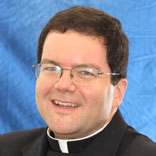After having reflected in previous months on the truth of God as Creator, we turn our attention now to the teaching of the Catholic Church on man as the centerpiece of his creation. By “man” here, we are referring to the creature that the Book of Genesis designates as ‘adam, that Hebrew word that doubles for our first ancestor’s name and for the sum total of all of us as his ancestors. It is for this reason that I don’t simply refer to “men and women” because what is at issue here includes our real unity, expressed biblically in the reference to our common ancestor.
Sadly, some today seem to value God’s supreme handiwork as merely one of His creatures, no more important than the animals and, quite perversely, sometimes valued even less than they are. It is illegal in theUnited Statesto kill a bald eagle, but not an unborn child. Many proponents of the “rights” of animals simultaneously advocate a so-called “right” to abortion or euthanasia. Actually, the immorality of the abuse of animals depends not on any “rights” that they supposedly have but on the dignity of the human person as the steward of God’s creation, bound to love and to care for the other elements of His creation who are put into the world for the sake of man.
[hotblock]
It is in man that the spiritual and material worlds come together. While man is subject to bodily death and to the disintegration of his physical remains, his spiritual soul is immortal and will be rejoined to his body in the resurrection at the end of time. The creation of man as both male and female constitutes the blueprint within creation of a life-giving and unbreakable communion of persons to mirror God’s own life as a communion of persons within the Holy Trinity.
The biblical story of the origin of the first woman from the body of the first man mirrors the natural fact of the origin of each one of us within the body of a woman, thus bespeaking the equality that exists between the two genders even in the context of their distinct identities and roles in the family, in the Church and in society.
Most astoundingly, it is man alone of all God’s creatures that Sacred Scripture describes as having been created “in the image of God.” Other creatures in their own way reflect the goodness and love of the Creator, but man is able to know his Creator, to love him freely, and to make a gift of himself to God and to others, thus exercising those natural gifts of intellect and will that pertain not merely to the bodily realm but to the spiritual.
In fact, reflecting on human experience in the light of biblical teaching, Catholic writers see in the human person a natural desire for God. AsSt. Augustineexpressed it best, “You have made us for yourself, O God, and our hearts are restless until they rest in you.” Though sometimes disguised by man’s frenetic attempts to quench this desire in created things, Pope Benedict reflected recently on this very dynamism in the human person as the expression of his divine vocation: “human desire tends always to concrete and determinate goods, sometimes not at all spiritual, and even so, he finds himself faced with the question of what is truly the Good, to be encountered outside of himself, one that man cannot construct but which he is called to recognize. What is it that can truly satisfy the human heart?” (General Audience, Nov. 7, 2012). Only God, by whom and for whom we exist.
Ultimately nothing speaks more eloquently of human dignity than the truth of our faith, hidden from the foundation of the world but made known with the coming of Jesus Christ. In Him we see that human nature was created for nothing less than union with God himself. The Son of Mary, our brother, is adored even by the angels as their God and Creator, and even in us they revere the human nature that has now been united forever to God’s own person and life. Because of this exalted dignity, the human race — and even a single human person — surpasses in value the rest of the physical universe combined.
If Christ had not come to us, we could not know how much God has loved us, but neither would we know how precious we are in His sight, and therefore how precious every human life, even the poorest, most vulnerable, the suffering — and yes, even the ornery! — should be to each one of us as well. As the SecondVaticanCouncil expressed it, “It is only in the mystery of the Word made flesh that the mystery of Man truly becomes clear” (Pastoral Constitution on the Church in the Modern World, Gaudium et spes, n. 22).
[For more, read Catechism of the Catholic Church, nn. 355-384; or United States Catholic Catechism for Adults, pp. 65-68; or Youcat, nn. 56-66]
PREVIOUS: Exercising those gratitude muscles
NEXT: Holiday dilemma: Feast with the in-laws or your own family?




Share this story